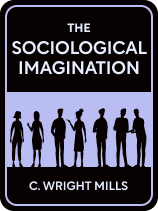

This article is an excerpt from the Shortform book guide to "The Sociological Imagination" by C. Wright Mills. Shortform has the world's best summaries and analyses of books you should be reading.
Like this article? Sign up for a free trial here .
What is grand theory in sociology? How well does it uphold the main purpose of social science?
In The Sociological Imagination, C. Wright Mills contends that not all approaches to social science are equal. He believes that his approach (sociological imagination) is the only way to preserve freedom. He offers a critique of other approaches, including grand theory, asserting that they fail to protect a free and open society in the way sociological imagination does.
Let’s take a look at what grand theory is—and how Mills thinks it fails to deliver.
Grand Theory in Sociology
What is grand theory in sociology? It’s a social science approach that attempts to define universal truths about the nature of society. We’ll define the main ideas and methods behind this approach as well as Mills’s arguments on why it’s flawed.
To fully understand Mills’s criticisms, it’s important to understand the personal context behind The Sociological Imagination. The book acts as Mills’s personal reflection on his career and his condemnation of academic sociology before leaving the field entirely. Perhaps due to this, many of Mills’s criticisms are personal—in a break from academic norms, he refers to several of his colleagues by name. This suggests that the following arguments aren’t just discussions of academic methods, but reflect a deeper concern and dissatisfaction with social science as a whole.
Defining Grand Theory
Instead of studying contemporary or historical examples to learn about one society, grand theorists attempt to create rules and systems that explain the nature of all societies and their histories. Grand theorists would argue that, when created correctly, these systems can explain any society or historical event.
To create these rules and systems, grand theorists create concepts: abstract ideas that explain certain truths about societies. Then, they try to refine and perfect the concepts’ definitions so they apply to all societies. For example, philosopher and sociologist Karl Marx famously defines all historical events as class struggles in The Communist Manifesto.
(Shortform note: Mills mainly frames his discussion of grand theory by talking about sociologist Talcott Parsons, who was famous for his influential, complex, and jargon-heavy work. However, many scholars of Parsons strongly disagree with Mills’s interpretation of his work. Mills mainly identifies Parson’s The Social System as a work of grand theory—but defenders of Parsons note that this book doesn’t suggest an approach entirely based in theoretical concepts. Instead, it provides theories and concepts as tools that sociologists can use to make their own work clearer and more precise. As a result, critics of Mills argue that his discussion of grand theory is seriously flawed since it’s based on misinterpretations.)
Flaws of Grand Theory
Mills argues that grand theory fails to preserve freedom—the main goal of social science. He outlines two main flaws that cause this failure: irrelevance and inaccessibility.
Irrelevance
By focusing entirely on abstract concepts rather than specific historical or societal examples, a grand theory approach is irrelevant to the lives of individuals. Mills argues that any concept that attempts to be universal cannot apply in any practical way to individuals. For example, a grand theorist creates a work explaining how marriage contributes to the structure and order of human civilization. Joe reads this work, but it doesn’t help him understand or address his marital problems—it’s so abstract that it’s completely disconnected from his personal experiences. Grand theory’s lack of relevance means that it fails to preserve freedom in that it can’t help individuals understand their personal problems or the major problems in their society.
(Shortform note: When Mills discusses irrelevance, he talks about works of grand theory on their own. This means he doesn’t consider how grand theories influence other works of social science—works that are relevant to the lives of individuals. Notable works of grand theory often inspire scholars and intellectuals to use or adapt their theories in a more pragmatic way. For example, while many criticize Jacques Derrida’s deconstruction theory as irrelevant or useless, feminist philosopher Judith Butler adopted deconstruction to create influential and relevant works on gender and sexuality like Gender Trouble or Bodies That Matter. This suggests that the relevance of a grand theory isn’t limited to the impact of the work itself.)
Inaccessibility
A grand theory approach to social science defines concepts in such a detailed and academic way that it creates inaccessible work. Mills argues that this obsession with concepts leads to dense, complicated, and jargon-heavy works of social science that don’t make sense to all but the most dedicated academics. Unsurprisingly, inaccessible works fail to help individuals understand the relationship between their lives and their society—and therefore fail to preserve freedom.
Example: Algerian-French philosopher Jacques Derrida created a method of analysis called “deconstructionism” that examines the hierarchical relations between binary oppositions resulting from logocentrism and focuses mainly on the margins and supplements of a text rather than its center.
| Defenses of Jargon Defenders of complex and inaccessible academic work argue that specifically defined concepts allow a work to express more nuance and clarity. Normal, accessible language relies on a preexisting shared understanding—for example, people who just saw Gone With the Wind all generally understand the plot, so normal language works to discuss it. But new, technical, or specific ideas don’t have a shared preexisting understanding, so normal language can’t effectively express them. For example, discussing a Freudian interpretation of Gone With the Wind without using any Freudian concepts inevitably leads to ambiguity, confusion, and extensive explanations. In that instance, while concepts make the conversation inaccessible to those unfamiliar with Freud, they also allow people to clearly communicate more complex ideas. |

———End of Preview———
Like what you just read? Read the rest of the world's best book summary and analysis of C. Wright Mills's "The Sociological Imagination" at Shortform .
Here's what you'll find in our full The Sociological Imagination summary :
- C. Wright Mills's theory of how social science can preserve freedom
- What grand theory is and how it's flawed
- How social science based entirely on empirical evidence harms freedom






